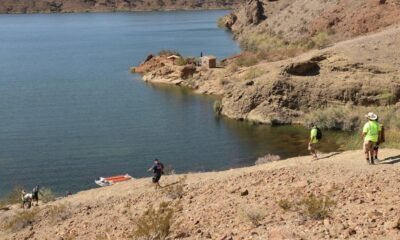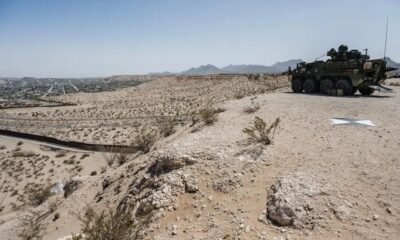arizona
28 Individuals Charged in Controversial New ‘National Defense Area’ Violation Along New Mexico Border

U.S. federal prosecutors in New Mexico have charged 28 individuals with unauthorized entry into a recently established “National Defense Area.” This designation, announced by the Trump administration, enables military personnel to detain individuals crossing from Mexico into the U.S., marking a significant shift in border policy.
Arrests took place over three days, starting April 24, with all individuals facing charges of unlawful entry and willful violations of the new defense area. This zone is located along a 60-foot stretch known as the Roosevelt Reservation, which is now integrated into a U.S. military installation.
These charges represent the first legal actions under the administration’s controversial strategy that aims to circumvent federal laws preventing military involvement in law enforcement at the border. Prosecutions were filed in U.S. District Court in Las Cruces, where illegal entry is classified as a federal misdemeanor, carrying fines and potential imprisonment.
Historically, previous administrations have maintained a separation between military duties and law enforcement actions, adhering to the Posse Comitatus Act. However, Trump has expressed a commitment to strengthened security measures, claiming that the southern border faces threats from various criminal entities.
The recent order to create the defense area has led to substantial military involvement at the border, particularly in Arizona. Military units, including infantry and military police, have been deployed to Yuma and Ft. Huachuca, equipped with advanced surveillance technology to monitor crossings.
Secretary of the Interior Doug Burgum has also transferred approximately 110,000 acres in New Mexico to the Army for a three-year period, underscoring the administration’s focus on enhanced border security. This transition aims to balance the protection of natural resources with military support for Border Patrol operations.
Under the new policy, military personnel will take active roles in establishing controlled access to the defense area and responding to unlawful crossings. The approach has sparked discussions about legality and ethical implications, particularly concerning the potential militarization of U.S. immigration enforcement.
By broadening the military’s role along the border, the Trump administration is challenging the historical constraints on military involvement in civilian law enforcement. The implications of these actions are far-reaching, raising questions about the future of border security and civil rights.


















